
A-Train III, known internationally as A-Train, is a 1990 computer game, is the third game in the A-Train series. It was originally developed and published by Japanese game developer Artdink for Japan, and was later published by Maxis for the United States.
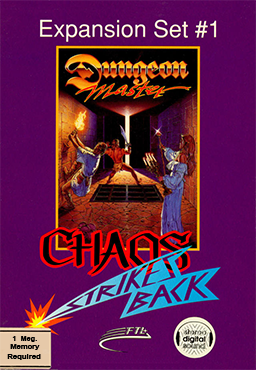
Chaos Strikes Back is an expansion and sequel to Dungeon Master, the earlier 3D role-playing video game. Chaos Strikes Back was released in 1989 and is also available on several platforms. It uses the same engine as Dungeon Master, with new graphics and a new, far more challenging, dungeon.
Artworx was a Naples, Florida software company that produced and supported a line of computer games from 1981 to 2015. It is named after the founder's given name. At first the company published a variety of games, including titles in adventure and arcade-action genres, but were later best known for a strip poker series.
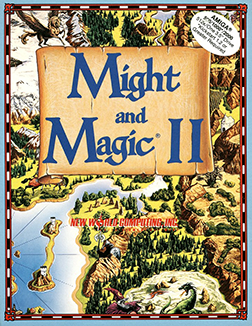
Might and Magic II: Gates to Another World is a role-playing video game developed and published by New World Computing in 1988. It is the sequel to Might and Magic Book One: The Secret of the Inner Sanctum.
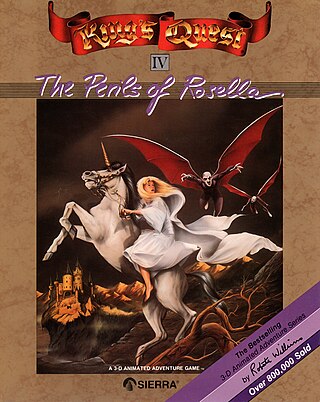
King's Quest IV: The Perils of Rosella is a graphic adventure game developed by Sierra On-Line for the MS-DOS, Amiga, Apple II, Apple IIGS, and Atari ST computers and released in 1988. The player takes on the role of Princess Rosella, daughter of King Graham of Daventry and the twin sister of Gwydion/Alexander, who must save her father and a good fairy and destroy an evil witch. Critically acclaimed, it was one of the first games for IBM PC compatibles to support a sound card.

Universe is a graphic adventure game developed and published by Core Design for the Amiga, Amiga CD32 and DOS platforms in 1994. It was Core Design's second and last effort in the adventure game genre after Curse of Enchantia, of which it was originally planned to be a sequel.

RoadBlasters is a vehicular combat game released in arcades by Atari Games in 1987. The player navigates an armed sports car through 50 different rally races, getting to the finish line before running out of fuel. Ports were released for a variety of home systems by Tengen and U.S. Gold.

Time Bandit is a maze shoot 'em up written for the TRS-80 Model I by Bill Dunlevy and Harry Lafnear and published by MichTron in 1983. It was ported to the TRS-80 Color Computer and Dragon 32, but enjoyed its greatest popularity several years later as an early release for the Atari ST. It was also released for the pseudo-PC-compatible Sanyo MBC-55x with 8-color display. Amiga and MS-DOS versions were ported by Timothy Purves.

Centurion: Defender of Rome is a turn-based strategy video game with real-time battle sequences, designed by Kellyn Beck and Bits of Magic and published by Electronic Arts. Originally released for MS-DOS in 1990, the game was later ported to the Amiga and the Sega Genesis in 1991. Centurion shares much of the concept and feel with Beck's earlier game Defender of the Crown (1987).

Elvira II: The Jaws of Cerberus is the second game in the Elvira series of horror adventure/role-playing video games. It was developed by Horror Soft and published by Accolade in 1992. The game is a sequel to 1990's Elvira: Mistress of the Dark. It was followed by Waxworks, which can be considered its spiritual sequel.
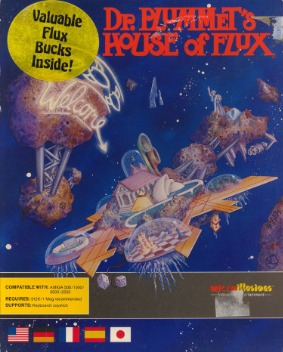
Dr. Plummet's House of Flux is a video game developed by MicroIllusions in 1989 for the Amiga.

Rings of Medusa is a fantasy-themed video game developed and published by Starbyte Software for the Amiga, Atari ST, Commodore 64, and MS-DOS in 1989. The game is a hybrid of role-playing, strategy, and trading genres. It received mixed reviews.

Wicked is a real-time strategy horror-themed video game released for the Amiga, Atari ST, and Commodore 64 in 1989 by Binary Vision and Electric Dreams Software. Activision had intended to release the game for MS-DOS with EGA graphics in 1989, but the port was cancelled.

Matrix Marauders is a 1990 racing video game, published by Psyclapse.
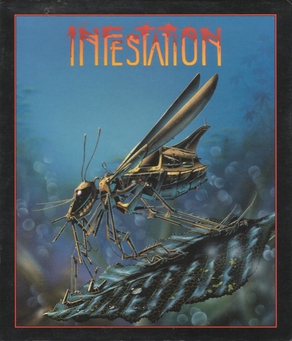
Infestation is a first-person action-adventure game released in 1990. The game was published by Psygnosis and released for the Amiga, Atari ST, and DOS. Based on a science fiction scenario inspired in part by the films Alien and Aliens, the player must rid a planetoid of insectoid alien life forms.
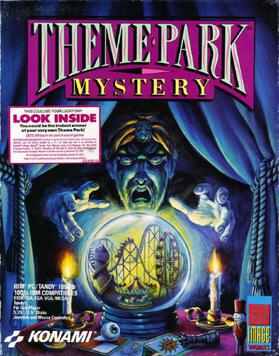
Theme Park Mystery is an adventure video game developed by Brian Howarth and Taeman Irmak released in 1990, for the Amiga published by Konami. It was also released to the Atari ST and MS-DOS later in 1990. The game features themes and activities surrounding a haunted and gruesome amusement park.

A.M.C.: Astro Marine Corps is a 1989 platform shooter video game developed by Creepsoft and published by Dinamic Software. It was released for the Amiga, Atari ST, Commodore 64, ZX Spectrum, MSX, and Amstrad CPC. The program as written by Pablo Ariza with music by José A. Martín.

Rules of Engagement is a 1991 video game published by Omnitrend Software and released in Amiga and DOS versions.
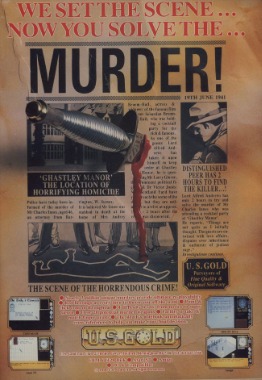
Murder! is a 1990 video game published by U.S. Gold.
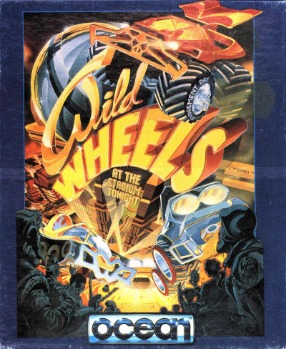
Wild Wheels is a 1991 video game published by Ocean Software.



















